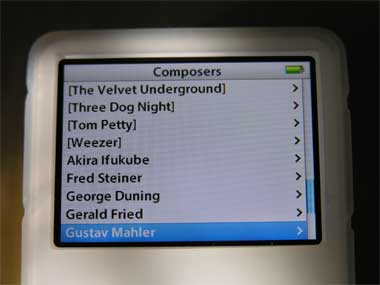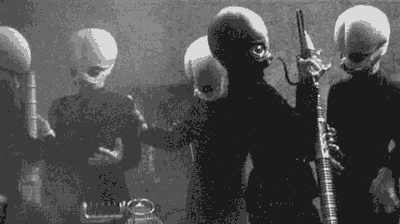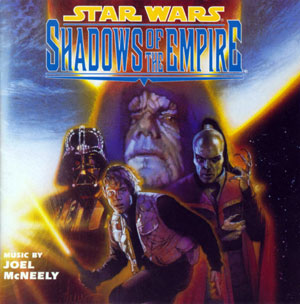Update: The revised sorting feature/problem in iTunes 7.3 and later renders portions of this advice useless. Some of it still applies for Smart Playlist building, but the segregated sorting no longer works. If you’re using a version prior to 7.3, go nuts. If you’re using 7.3 or later, be warned.
In striving for zen-like simplicity while maintaining and extending the usability of iTunes, please follow me as I introduce you to the technique I use to keep my Composer tags orderly and navigable particularly when using an iPod. The idea is to streamline the presentation of the tags while adding meaning to them.
In my library there are three types of songs that require use of the composer tag:
- Classical and other so-called “serious music”
Principally includes all works by traditionally-recognized composers and performed by orchestras, quartets, etc. Also includes film and television recordings that are not the originals, such as when the Royal Philharmonic plays Star Trek or Trotter Trio’s jazz CD Sketches on Star Wars.
- Cover songs
Whether live or in studio, remakes or performances of songs that were originally recorded and released by another artist or group.
- Remix Albums
Collections of remixes of other artists’ songs released under the marquee of the remixer. For example: Fila Brazillia’s Brazilification.
If a song in my library doesn’t belong to one of those categories, the composer tag is left empty, completely blank. There’s no need to use the tag in the pop/rock idiom; all the relevant info is contained in the song-artist-album structure.
The same goes for movie scores and other “Original Motion Picture Soundtracks.” It’s redundant to put “John Williams” in both the artist and composer when it’s his recording of the original release of the album that you’re tagging.
Some people are tempted to put the songwriter in the Composer space and CDDB/Gracenote often includes it when retrieving a CD.
Well, don’t. And if you already have, delete it.
How likely are you to go to the Composer field and select “Cobain, Kurt” when you want to hear Heart-shaped Box? Not very, I’m sure. You are much more likely to select “Nirvana” from the Artist field. If you must obsessively keep that info, put it in the Comments field. That way you can still find it in your Encyclopedia iTunica if you need it, but it won’t get in the way of using your iPod.
So how do we keep these styles from intermingling, so that you don’t end up with Guns n’ Roses next to Gustav Mahler?
It’s rather easy; just add leading character to the beginning of your composer text based on the type of file it is, particularly if a song does not fall into the Classical category.
In my scheme, classical music takes priority, as it is the format that best benefits from using the field. In these cases, the composer is, well, the composer. Syntax is up to you: Mahler; Gustav Mahler; Mahler, Gustav; however you see fit to do it.
Likewise for film and tv music that’s not from the original release. I treat those recordings the same as classical. The Artist tag goes to the ensemble performing the work while the original composer gets credit in the Composer tag.

Cover Tunes
With cover tunes, the original performer’s name is surrounded by brackets [ ]. So when The Cardigans play a Black Sabbath song Iron Man, the Composer tag looks like this [Black Sabbath]. Now all the cover songs are sorted alphabetically together on the iPod. Plus, I can create a Smart Playlist with condition Composer starts with [ and have all of them gathered in a single spot. If new cover tunes get added in the future, they’re automatically included in the Smart Playlist.

Cover tunes smart playlist. Click to see larger version.
Finally, there’s remix albums. There’s a long discussion to be had about how to treat those with iTunes.
Hopefully, these suggestions are helpful and will assist in taking full advantage of iTunes’/iPod’s power.







